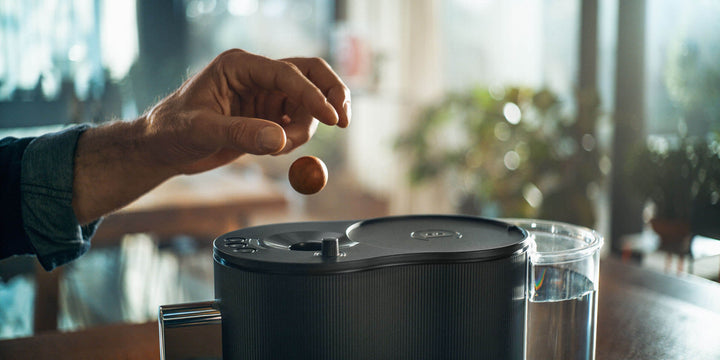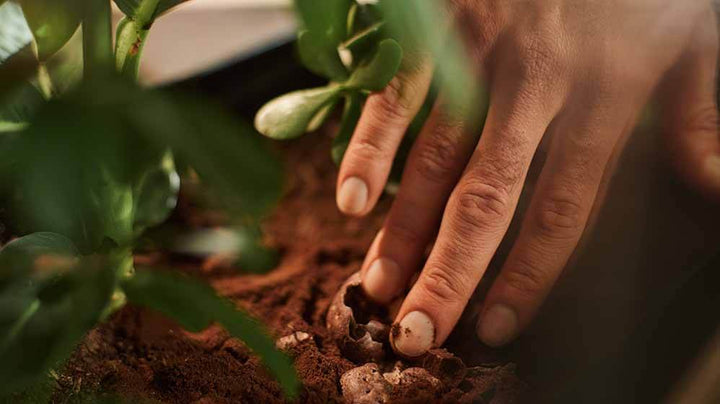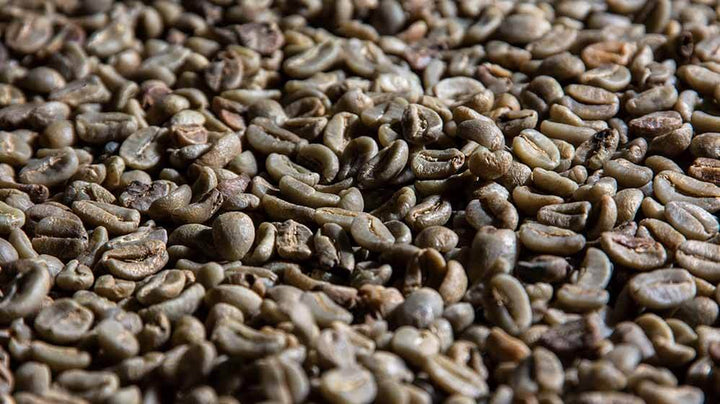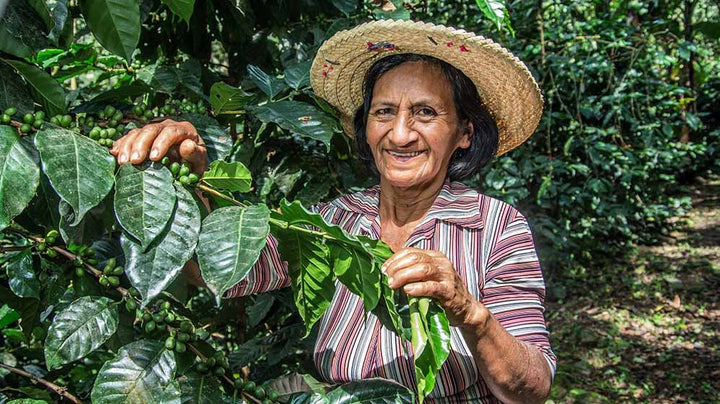News
-
-
,
-
David Salama
CoffeeB Globe: The coffee machine with 100% compostable coffee balls.
The CoffeeB Globe coffee machine is a single-dose system featuring innovative, patented percolation technology. It offers all the practical benefits of a capsule machine, such as a choice of varieties and different intensity levels. It eliminates the need for plastic or aluminum capsules, while allowing you to choose the best coffee for your mood, cup after cup. Made entirely from coffee, the coffee balls are simply wrapped in a protective layer of natural origin.Thanks to its modular design, the CoffeeB machine can be repaired by our service centers. Individual components, such as the percolator, electronics, pump, heating system and frother, can be replaced separately.
Read article -
-
-
,
-
David Salama
Coffee composting: basic principles
Coffee grounds are worth their weight in gold! It contains the three macronutrients plants need to thrive: nitrogen, phosphorus and potassium. Coffee grounds are therefore ideal for composting.Coffee grounds encourage the growth of the Trichoderma fungus, which is very useful in compost. This green fungus looks a bit like mold - perhaps you've come across it at home on old coffee grounds. It improves soil health, stimulates plant growth and even protects against disease.Another great advantage of coffee grounds is that they feed earthworms. Rich soil in turn attracts living organisms that further improve compost quality. Earthworms aerate and fertilize the soil by eating organic matter and producing vermicompost. Fortunately, earthworms love coffee grounds!If you've been wondering why you didn't know all this time, and why you've been throwing huge quantities of coffee grounds in the garbage can, take comfort in the fact that at least now you do! What's more, CoffeeB offers you a truly fantastic coffee-making system, based on easy-to-compost coffee grounds. How to compost your coffee grounds? The great thing about used coffee grounds is that they're worth their weight in gold. Free from plastic or aluminium, they are made from roasted coffee and are fully compostable.Coffee grounds are suitable for all types of composting: in a vermicomposter to feed earthworms, in garden compost or even in your bokashi composter at home. Every time you make yourself a good cup of coffee, the used coffee grounds fall into your machine's collection bin. Empty the bin regularly and place the balls as they are in your compost. They'll be fully decomposed after 12 weeks at the latest.
Read article -
-
-
,
-
David Salama
CoffeeB: sustainable from raw material to recycling
Coffee beans are the main raw material for our coffee balls. Depending on their variety, they come from different production regions around the world: our beans come from Brazil, Colombia, Peru, Vietnam, India, Guatemala, Tanzania, Ethiopia and Kenya. We take our responsibility seriously, right from the growing stage. Every single coffee ball is Rainforest Alliance, Fairtrade or Organic certified. With these sustainability certificates, we not only want to ensure that our coffee balls produce little waste, but also that they comply with socially and environmentally responsible criteria. Find out more about the different certificates for our coffee balls here. What is the Rainforest Alliance? Most coffee balls are Rainforest Alliance Certified. Others are labeled Organic or Fairtrade. The Rainforest Alliance is committed to more sustainable farming methods, ensuring a better future for people and nature.Rainforest Alliance Certified producers adhere to strict standards of sustainable agriculture and manage their operations professionally. To achieve this, they are trained in cultivation methods that not only protect the environment, but also ensure more abundant harvests and thus higher incomes. Certified coffee growers thus actively contribute to environmental protection, notably by conserving natural resources, using fertilizers and plant protection products in smaller, more targeted quantities, and avoiding waste.Certified coffee plantations are also required to meet minimum social standards: they support the development of decent wages, provide suitable accommodation and access to drinking water, sanitation and medical care. The Rainforest Alliance also promotes gender equality and fights discrimination and child labor. What does Fairtrade mean? Fairtrade stands for fair trade on equal terms with producers. The Fairtrade label identifies products that have been produced according to socially, ecologically and economically responsible standards. Thanks to Fairtrade, coffee producers benefit from minimum prices and a premium. To achieve this, producers must be organized into cooperatives. Fairtrade helps smallholders and workers to improve their living conditions on their own. Socially and environmentally responsible production and fair trading conditions are the cornerstones of this standard. What does Bio mean? The Bio label promotes the production of food in harmony with nature. The well-being of humans, animals and plants is as important to organic farmers as soil fertility, biodiversity and the respectful use of water. Genetically modified organisms are banned, and the use of additives and synthetic chemical ingredients is avoided. Soil, water and the environment are less affected. In principle, air transport is prohibited for Migros Organic products. Train and boat are preferred.Our organic coffee balls are available with the Fairtrade label. This means that all our raw materials come from a socially, economically and ecologically sustainable supply chain. To find out where some of our organic coffee comes from, read our article on Mamahuaca.
Read article -
-
-
,
-
David Salama
Where does our organic coffee come from?
Grown in Peru in harmony with nature: That's where some of our organic coffee comes from. In the Andes of north-western Peru lies Punku Rumi, home to a group of Quechua people. Here, over 300 farmers have worked the land for hundreds of years, handing it down from generation to generation. Spread over two valleys and 17 villages, they grow their coffee using traditional methods and are organized into a community, the asociación Mamahuaca, named after a local legend.Whenever possible, we buy the beans of the two organic varieties in the CoffeeB range from the Mamahuaca association. Café Royal and CoffeeB are the association's main customers: together, we buy virtually all their coffee.To this day, the farmers of the Mamahuaca group grow their coffee using traditional ecological methods that preserve nature. This environmentally-friendly cultivation and the high altitude of the coffee plantations result in a coffee with incomparable flavour, perfectly in tune with CoffeeB's values of sustainability and taste. Traditional coffee-growing in Mamahuaca The farmers of Mamahuaca harvest only ripe red coffee cherries. The beans are then mechanically pulped on the same day, and fermented for around 18 hours. Due to the very high altitude of the growing areas, between 1,500 and 2,100 meters above sea level, and the relatively dry climate, the fermentation process is considerably longer than average and also gentler.After fermentation and washing, the coffee beans are dried using a special process. Placed on stones - the numerous rocks in the region offer a wide range of possibilities - they are dried only under the sun's rays. The Mamahuaca association's natural processing method is one of a kind. What CoffeeB and Mamahuaca have in common The Mamahuaca way of life is simple. Apart from coffee grown for export, most of their agricultural production is for personal consumption: beans, corn, wheat, citrus fruits, bananas, cassava, avocados or exotic fruits such as guava, grenadelle or chirimoya. Members of the Mamahuaca association rarely buy other imported food products in stores. Likewise, typical outfits are mainly handmade by the women of the community using ancient local methods. Blankets, bags, ponchos and skirts are made from sheep's wool and alpaca fibers, as well as from natural dyes extracted from leaves or fruit in a time-consuming process lasting several weeks. Coffee also plays an important role in culture and daily life: once a year, the indigenous population organizes the "Festival anual de Café" in July. Traditional costumes are adorned with coffee-tree accessories. This simplicity and close connection with nature are also reflected in our organic coffee balls made from Mamahuaca coffee beans. Going for the essential, using what nature offers, exploiting it responsibly and living coffee culture: these are the shared values that drive CoffeeB and Mamahuaca. The perfect symbiosis for the best coffee.You can find out more about the countries from which our coffee beans are sourced in our article on sustainability certificates.
Read article -




